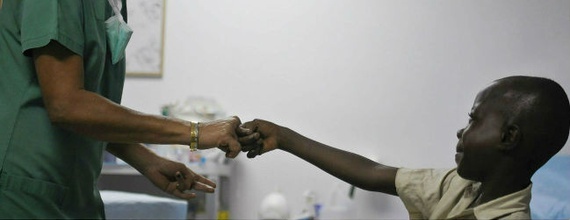My New Year's resolution 2014: fewer demons.
There were a lot of demons in 2013. Some like Typhoon Haiyan were faceless, and not of our making. Most demons, though, were human, and their demonism was a false and human creation.
2013 saw many people treated like demons: Ted Cruz, Barack Obama, Justine Sacco, Miley Cyrus, gays, the GOP, Paula Deen, Pope Francis. The list goes on*. I revere some of these demonized people, and others I don't. But inarguably these people and many others like them have fallen prey to our abbreviated, stereotyped, uncharitable understanding of the Other. The Other is, like us, flawed. Capable of great sin, even. But when we sit in judgment of them, dispassionately, unforgivingly, we commit a second sin of our own.
My trip to the United States Holocaust Memorial Museum was a powerful reminder of how this kind of polarization and demonization can lead to evil. One large portion of the determination it took to build that institution came from one of my favorite Georgetown professors, Michael Berenbaum. Berenbaum was an inspirational teacher at Georgetown, and in between classes he flew frequently to Europe to collect artifacts for the Holocaust Memorial Museum. A student once asked Berenbaum how he accomplished so much. Berenbaum paused at the front of the class, silent for a moment with his tie torn in honor of his recently deceased father. He had bags under his eyes from a recent transatlantic flight. "You know how you doubt yourself?" he asked, "You spend time asking, 'Can I do this?' or saying to yourself, 'I'm not smart enough?'" He said he used the time most spend on self-doubt to accomplish a little more of his life mission. In his case that mission was to help avert future evil through the remembrance of the Shoah, but whatever your mission, that there is sound advice.
So: in 2014, I will debate the issues, perhaps even loudly, but I will try my best to be civil and respectful and not to make a demon out of anyone. This is especially important precept to follow amid strong disagreement. Along the way, as much as I can, I will keep my focus on achieving my mission and not on how great or poorly I am looking along the way.
In a related vein, critic Frank Bruni had a timely message recently: Tweet less, read more. Bruni argues that in the Age of Twitter we are too apt to make snap judgments without letting the full complexity of the situation "steep" in the way it may when we take time to ponder. As we do when reading fiction. Amen, I say, amen! Hallelujah!
Prohibitions like these - don't hate, don't fear - are good, but they don't fill me up. As a result, I will keep this photograph in mind as well.
Taken from the Year in Pictures at The New York Times, this is an Afghan schoolgirl, reading. Considering how hard-won the freedom to read a few words of text can be in towns like hers, this powerful reminder of the preciousness of learning and education will be one guide for me through the challenges of 2014.
Gratitude, too, will guide me. I am grateful for the connections I made in 2014: my wonderful patients, an inspiring troupe of medical educators, our vibrant hospital ethics committee, and a motley cast of Twitter characters. I cannot imagine better company in 2014.
Happy New Year!
* PS Shortly after I posted this article, I was pained to see a crowd of science writers whom I respect sit in rather snarky judgment of another excellent writer (and my former editor), Bora Zivkovic.
Way back in 2013, Zivkovic had apologized (imperfectly) when accused of sexual harassment by more than one female science writer. As New Year's Day unfolded, Zivkovic's story looked like a hunk of red meat amid a pack of wolves. Much as it had in fall 2013.
There were many reasonable-sounding justifications for the public flogging: sexual harassment must be stomped out, Zivkovic appeared to want to make a fresh start without making enough apologies to satisfy everyone, this was a pattern that exemplifies the male power structure in science, etc etc.
What reasonable person would argue these points? What emerging science writer would dare raise his or her voice amid all that certainty, and blood? Such a person risks being lumped with perpetrators, surely.
Yet silence is not always golden. What was lost amid the din was the idea that there are more effective and more humane ways of rectifying such wrongs than a Twitter hanging. Some writers wrote they were done hearing from not only Zivkovic but a friend who supported him. "They're dead to me," that writer and her supporters seemed to say. Others, most of them not at least publicly victims of the behavior of which Zivkovic is accused, critiqued whether his apology felt ... apologetic enough.
For all involved, I hope this private problem can have a private fix. I just don't see how this public excoriation helps anybody. Certainly decrying sexual harassment in public can do good: it may well discourage other perpetrators and help define what is and what is not harassment. This is the core story to which the public dialog should hew. But this public mastication and remastication of one man's sin went beyond PSA - it looked to me like bloodlust and distracted from the main story.
Instead, private apologies and a private plan for prevention seem the way to salvage some good from this story. Most importantly, any victims (identified in public or not) should have the opportunity to hear an apology and some assurances that harassment will not recur. I get the sense from Zivkovic's writing that he is willing to make such amends and hope this indeed occurs at least to some degree of satisfaction of those he harmed.
What should the rest of us do with our typing fingers while such things occur in private? Get a PSA out there, for sure. Learn. Listen. Consider if we could commit that same sin and how we might avoid it. Most of this can occur with mouths shut and fingers still. (See Bruni, above.) And then: we move forward.
When identifying a sin such as Zivkovic's, it is too easy to think of him as equivalent to and nothing more than the sin itself. Without considering the full scope of his humanity and his personhood, we essentially commit a second sin. It's an easy sin - we make a joke, we pass judgment, we block a Twitter account. No one of these acts is a major problem. But I worry about a society build on such a foundation.
Some would say such protestations enable the original sin itself. That whatever is done in the defense of those wronged women is fair game. This is the game of empowered white men, goes the screed. They should be quiet and take their licks. It is the turn of the downtrodden to rise up and take the stage.
I disagree. Unless we are simply trading bad power for bad power, we who think of ourselves as good should be able to think with nuance, and to hold two ideas in our heads at once. A sinner can be wronged. A victim can do wrong. (Not to imply this has occurred; I'm saying we should be able to think in more than black and white.) It'd be great if the world were divided into good and evil but the truth is most of us fall somewhere in between. Sinners and pundits look quite a lot alike, it turns out. Perhaps it is the similarity that motivates the pundits to make a starker distinction than really exists? Or perhaps we forget our own troubles for a while when we decry someone else's?
I can only hope the virtual community erected on Twitter and on blogs can learn from the mistakes made in the corporeal society that preceded it. Yes, there are invidious power structures here and we should fight them. We too need justice. But, a system of justice build on vengeance and demonization will ultimately be the downfall of all our lofty ideals. We aren't being soft on crime - we are trying not to compound the original crime with a new one.
The way forward? The original victims should expect reparation. Absolutely. But those looking on from their typewriters, from their comfortable seats at the edge of the town square, should behave as gently and as humanely in their responses to this sinner - this man - as they would hope to be treated when they too walk out into the middle of the square with their sin in full view. We all have our day. What kind of people are we? Are we vengeful, or are we just?

![[ M U R M U R S ]](http://images.squarespace-cdn.com/content/v1/51efa33ce4b09afa04cb2a66/1376911411704-LDY4UEIH1WRGPUXTMLJU/Logo.jpg?format=1500w)













